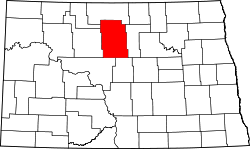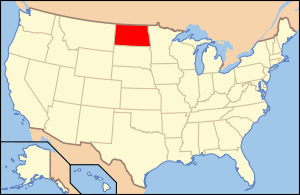McHenry County, North Dakota
| McHenry County, North Dakota | |
|---|---|
|
McHenry County Courthouse | |
 Location in the U.S. state of North Dakota | |
 North Dakota's location in the U.S. | |
| Founded | October 15, 1884 |
| Seat | Towner |
| Largest city | Velva |
| Area | |
| • Total | 1,912 sq mi (4,952 km2) |
| • Land | 1,874 sq mi (4,854 km2) |
| • Water | 38 sq mi (98 km2), 2.0% |
| Population (est.) | |
| • (2015) | 5,968 |
| • Density | 2.9/sq mi (1/km²) |
| Congressional district | At-large |
| Time zone | Central: UTC-6/-5 |
| Website |
www |
McHenry County is a county located in the U.S. state of North Dakota. As of the 2010 census, the population was 5,395.[1] Its county seat is Towner.[2]
The Territorial legislature formed McHenry County in 1873 from part of Bottineau County. The name comes from James McHenry, an early settler of Vermillion, South Dakota. The county government was first organized on October 15, 1884.[3] Before becoming Towner in 1886, the county seat was Villard from 1884 to 1885 and Scriptown from 1885 to 1886.[4] Both former seats are now ghost towns.
McHenry County is part of the Minot, ND Micropolitan Statistical Area.
Geography
According to the U.S. Census Bureau, the county has a total area of 1,912 square miles (4,950 km2), of which 1,874 square miles (4,850 km2) is land and 38 square miles (98 km2) (2.0%) is water.[5]
Major highways
 U.S. Highway 2
U.S. Highway 2 U.S. Highway 52
U.S. Highway 52 North Dakota Highway 14
North Dakota Highway 14 North Dakota Highway 19
North Dakota Highway 19 North Dakota Highway 41
North Dakota Highway 41 North Dakota Highway 53
North Dakota Highway 53 North Dakota Highway 97
North Dakota Highway 97
Adjacent counties
- Bottineau County (north)
- Pierce County (east)
- Sheridan County (southeast)
- McLean County (southwest)
- Ward County (west)
- Renville County (northwest)
National protected areas
- Cottonwood Lake National Wildlife Refuge
- J. Clark Salyer National Wildlife Refuge (part)
- Wintering River National Wildlife Refuge
Demographics
| Historical population | |||
|---|---|---|---|
| Census | Pop. | %± | |
| 1890 | 1,584 | — | |
| 1900 | 5,253 | 231.6% | |
| 1910 | 17,627 | 235.6% | |
| 1920 | 15,544 | −11.8% | |
| 1930 | 15,439 | −0.7% | |
| 1940 | 14,034 | −9.1% | |
| 1950 | 12,556 | −10.5% | |
| 1960 | 11,099 | −11.6% | |
| 1970 | 8,977 | −19.1% | |
| 1980 | 7,858 | −12.5% | |
| 1990 | 6,528 | −16.9% | |
| 2000 | 5,987 | −8.3% | |
| 2010 | 5,395 | −9.9% | |
| Est. 2015 | 5,968 | [6] | 10.6% |
| U.S. Decennial Census[7] 1790-1960[8] 1900-1990[9] 1990-2000[10] 2010-2015[1] | |||
2000 census
As of the census of 2000, there were 5,987 people, 2,526 households, and 1,699 families residing in the county. The population density was 3 people per square mile (1/km²). There were 2,983 housing units at an average density of 2 per square mile (1/km²). The racial makeup of the county was 98.73% White, 0.08% Black or African American, 0.40% Native American, 0.03% Asian, 0.05% from other races, and 0.70% from two or more races. 0.40% of the population were Hispanic or Latino of any race. 45.4% were of German and 34.0% Norwegian ancestry.
There were 2,526 households out of which 28.3% had children under the age of 18 living with them, 58.2% were married couples living together, 5.6% had a female householder with no husband present, and 32.7% were non-families. 29.8% of all households were made up of individuals and 15.40% had someone living alone who was 65 years of age or older. The average household size was 2.35 and the average family size was 2.92.
In the county the population was spread out with 24.0% under the age of 18, 5.9% from 18 to 24, 23.3% from 25 to 44, 25.1% from 45 to 64, and 21.8% who were 65 years of age or older. The median age was 43 years. For every 100 females there were 103.9 males. For every 100 females age 18 and over, there were 101.0 males.
The median income for a household in the county was $27,274, and the median income for a family was $35,676. Males had a median income of $25,740 versus $18,505 for females. The per capita income for the county was $15,140. About 12.0% of families and 15.8% of the population were below the poverty line, including 18.5% of those under age 18 and 16.8% of those age 65 or over.
2010 census
As of the 2010 United States Census, there were 5,395 people, 2,377 households, and 1,527 families residing in the county.[11] The population density was 2.9 inhabitants per square mile (1.1/km2). There were 2,948 housing units at an average density of 1.6 per square mile (0.62/km2).[12] The racial makeup of the county was 97.8% white, 0.6% American Indian, 0.3% Asian, 0.1% black or African American, 0.3% from other races, and 0.9% from two or more races. Those of Hispanic or Latino origin made up 1.5% of the population.[11] In terms of ancestry,[13]
Of the 2,377 households, 25.3% had children under the age of 18 living with them, 53.9% were married couples living together, 5.8% had a female householder with no husband present, 35.8% were non-families, and 31.3% of all households were made up of individuals. The average household size was 2.25 and the average family size was 2.81. The median age was 46.2 years.[11]
The median income for a household in the county was $36,944 and the median income for a family was $54,350. Males had a median income of $36,625 versus $26,205 for females. The per capita income for the county was $22,911. About 6.4% of families and 12.3% of the population were below the poverty line, including 17.1% of those under age 18 and 17.9% of those age 65 or over.[14]
Communities
Cities
Townships
- Anamoose
- Balfour
- Bantry
- Berwick
- Bjornson
- Brown
- Cottonwood Lake
- Deep River
- Deering
- Denbigh
- Egg Creek
- Falsen
- Gilmore
- Granville
- Grilley
- Hendrickson
- Karlsruhe
- Kottke Valley
- Lake George
- Lake Hester
- Land
- Layton
- Lebanon
- Little Deep
- Meadow
- Mouse River
- Newport
- Normal
- North Prairie
- Norwich
- Odin
- Olivia
- Pratt
- Riga
- Rose Hill
- Round Lake
- Saline
- Schiller
- Spring Grove
- Strege
- Velva
- Villard
- Voltaire
- Wagar
- Willow Creek
Unincorporated communities
Notable people
- Sondre Norheim - pioneer of modern skiing
See also
References
- 1 2 "State & County QuickFacts". United States Census Bureau. Retrieved November 1, 2013.
- ↑ "Find a County". National Association of Counties. Archived from the original on May 31, 2011. Retrieved 2011-06-07.
- ↑ "Dakota Territory, South Dakota, and North Dakota: Individual County Chronologies". Dakota Territory Atlas of Historical County Boundaries. The Newberry Library. 2006. Retrieved February 3, 2015.
- ↑ "County History". Official Portal for North Dakota State Government. Retrieved 4 May 2011.
- ↑ "2010 Census Gazetteer Files". United States Census Bureau. August 22, 2012. Retrieved February 1, 2015.
- ↑ "County Totals Dataset: Population, Population Change and Estimated Components of Population Change: April 1, 2010 to July 1, 2015". Retrieved July 2, 2016.
- ↑ "U.S. Decennial Census". United States Census Bureau. Archived from the original on May 11, 2015. Retrieved February 1, 2015.
- ↑ "Historical Census Browser". University of Virginia Library. Retrieved February 1, 2015.
- ↑ Forstall, Richard L., ed. (April 20, 1995). "Population of Counties by Decennial Census: 1900 to 1990". United States Census Bureau. Retrieved February 1, 2015.
- ↑ "Census 2000 PHC-T-4. Ranking Tables for Counties: 1990 and 2000" (PDF). United States Census Bureau. April 2, 2001. Retrieved February 1, 2015.
- 1 2 3 "DP-1 Profile of General Population and Housing Characteristics: 2010 Demographic Profile Data". United States Census Bureau. Retrieved 2016-03-14.
- ↑ "Population, Housing Units, Area, and Density: 2010 - County". United States Census Bureau. Retrieved 2016-03-14.
- ↑ "DP02 SELECTED SOCIAL CHARACTERISTICS IN THE UNITED STATES – 2006-2010 American Community Survey 5-Year Estimates". United States Census Bureau. Retrieved 2016-03-14.
- ↑ "DP03 SELECTED ECONOMIC CHARACTERISTICS – 2006-2010 American Community Survey 5-Year Estimates". United States Census Bureau. Retrieved 2016-03-14.
External links
 |
Renville County | Bottineau County |  | |
| Ward County | |
Pierce County | ||
| ||||
| | ||||
| McLean County | Sheridan County |
Coordinates: 48°14′N 100°38′W / 48.23°N 100.64°W